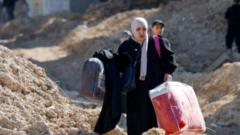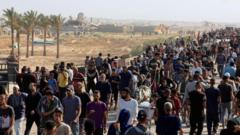The Israeli military operation known as "Operation Iron Wall" has triggered significant humanitarian concerns as thousands of Palestinians flee their homes, facing immense challenges in securing basic necessities and medical care.**
Crisis Unfolds as Thousands Displaced in West Bank Amid Israeli Military Operations**

Crisis Unfolds as Thousands Displaced in West Bank Amid Israeli Military Operations**
Ongoing Israeli military raids lead to the forced relocation of approximately 40,000 Palestinians from refugee camps in the West Bank, marking the largest displacement since 1967.**
In an unprecedented humanitarian crisis, approximately 40,000 Palestinians have been displaced from their homes in the West Bank due to an escalating military operation by Israeli forces, dubbed "Operation Iron Wall." This surge in displacement marks the largest forced exodus of Palestinians from refugee camps since Israel's occupation following the 1967 Six Day War.
Among the displaced is Alaa Ofi, who recounts the harrowing experience of being uprooted from Tulkarm refugee camp — a community established in the 1950s for those fleeing conflict. "The army forced us out. We left our documents, clothes, and everything at home," he said, grappling with the pressing needs of his wife, who is expecting a baby.
The ramifications of the Israeli operation have rippled through the region, with aid agencies expressing alarm over the humanitarian implications. The displacement has extended beyond Tulkarm to Nur Shams, Jenin, and Far'a camps, where many residents are struggling to find affordable lodging and access critical resources like identification and medical care left behind amid the chaos.
Reports reveal that since the operation commenced in January, there have been significant physical alterations to the camps, with roads destroyed and homes demolished. Eyewitness accounts from the Tulkarm camp show a once-thriving community reduced to rubble, highlighting the immediacy and severity of the crisis.
Israeli officials assert the motives behind the operation are to target militant groups that threaten Israel's security. However, the tactics employed have raised concerns of collective punishment among civilians, as reports indicate residents have been forced to evacuate under duress, with directives reportedly conveyed via drones.
Palestinian officials have labeled the operation a "declaration of war," warning that such military actions threaten not only the homes but the very fabric of Palestinian society. Governor Abdullah Kmeil of Tulkarm articulated this sentiment, stating that the operation seeks to instill fear and create conditions for permanent displacement.
The ongoing violence has already taken a toll, with casualties documented on both sides, and there remains uncertainty about the duration of the military presence and its impact on civilians. As displaced families like the Ofi’s grapple with an uncertain future, they are left to wonder how long they can endure being uprooted from their homes.
"If we can't go back in a year, it’s going to be a disaster," Alaa warned, voicing the growing despair that pervades an already fragile existence amidst the escalating conflict.
Among the displaced is Alaa Ofi, who recounts the harrowing experience of being uprooted from Tulkarm refugee camp — a community established in the 1950s for those fleeing conflict. "The army forced us out. We left our documents, clothes, and everything at home," he said, grappling with the pressing needs of his wife, who is expecting a baby.
The ramifications of the Israeli operation have rippled through the region, with aid agencies expressing alarm over the humanitarian implications. The displacement has extended beyond Tulkarm to Nur Shams, Jenin, and Far'a camps, where many residents are struggling to find affordable lodging and access critical resources like identification and medical care left behind amid the chaos.
Reports reveal that since the operation commenced in January, there have been significant physical alterations to the camps, with roads destroyed and homes demolished. Eyewitness accounts from the Tulkarm camp show a once-thriving community reduced to rubble, highlighting the immediacy and severity of the crisis.
Israeli officials assert the motives behind the operation are to target militant groups that threaten Israel's security. However, the tactics employed have raised concerns of collective punishment among civilians, as reports indicate residents have been forced to evacuate under duress, with directives reportedly conveyed via drones.
Palestinian officials have labeled the operation a "declaration of war," warning that such military actions threaten not only the homes but the very fabric of Palestinian society. Governor Abdullah Kmeil of Tulkarm articulated this sentiment, stating that the operation seeks to instill fear and create conditions for permanent displacement.
The ongoing violence has already taken a toll, with casualties documented on both sides, and there remains uncertainty about the duration of the military presence and its impact on civilians. As displaced families like the Ofi’s grapple with an uncertain future, they are left to wonder how long they can endure being uprooted from their homes.
"If we can't go back in a year, it’s going to be a disaster," Alaa warned, voicing the growing despair that pervades an already fragile existence amidst the escalating conflict.



















